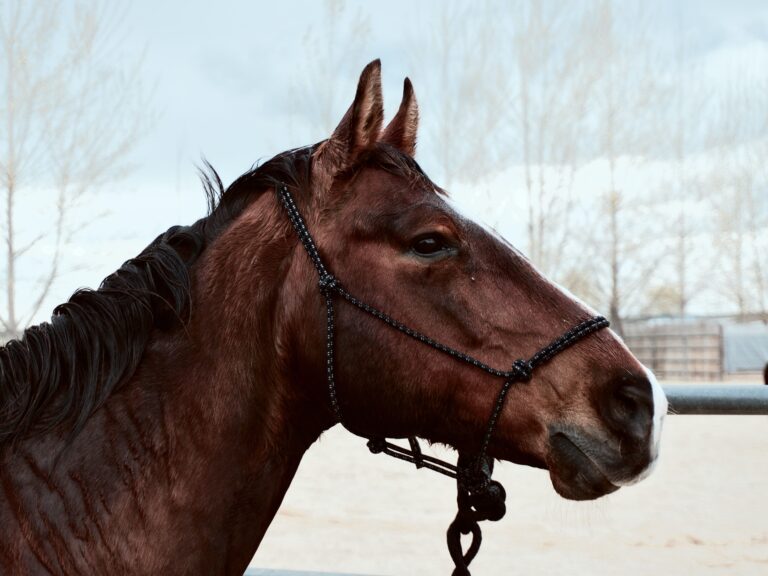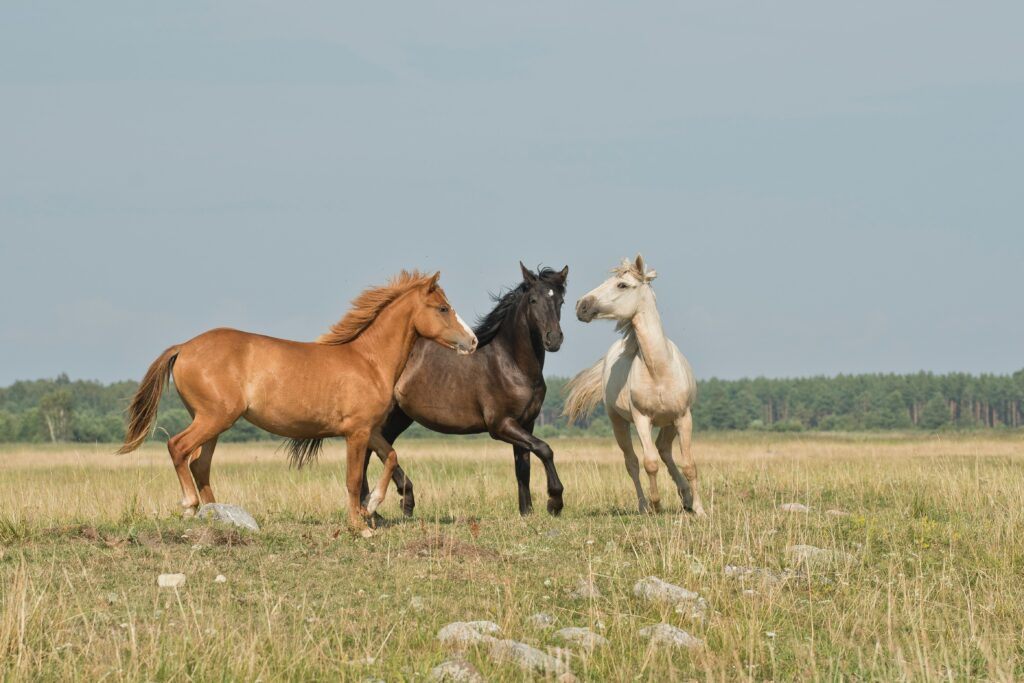
As horse owners, we want to make sure our horses are happy and healthy. One important aspect of their well-being is making sure they are mentally stimulated and not bored. But how can you tell if your horse is bored?
Your horse may be bored if they display certain behaviors such as cribbing, weaving, pawing, or constantly moving around their stall. They may also seem uninterested in their surroundings and have a lack of energy or enthusiasm.
Keep reading to learn more about specific signs of boredom, why boredom is a concern for horses, and how you can prevent it.
Signs of a Bored Horse
In some ways, boredom in horses looks a lot different than boredom in humans. You’re (hopefully) never going to see any person cribbing away on a door frame. But restlessness and listlessness? You can see these in horses too. Here are some other signs:
Cribbing
As a horse owner, you may have heard the term “cribbing” before. Cribbing is a stereotypic behavior in horses, characterized by a horse grasping an object with its front teeth and then pulling back while arching its neck, often making a grunting noise.
Cribbing is considered a sign of boredom in horses because it is often seen in horses that are confined to their stalls for long periods of time without sufficient mental stimulation or exercise. While the exact cause of cribbing is not fully understood, it is believed to be a self-rewarding behavior that releases endorphins, which can create a feeling of pleasure or satisfaction for the horse.
Cribbing can be a problematic behavior for horse owners, as it can cause damage to the horse’s teeth and the objects they crib on, as well as create noise and a nuisance to other horses nearby. Therefore, it is important to provide horses with plenty of turnout time and access to forage to help prevent boredom and reduce the likelihood of cribbing behavior.
Weaving and Bobbing
Weaving or bobbing is another sign of boredom in horses. Weaving is when a horse rocks its body back and forth while standing in place, while bobbing involves a horse bobbing its head up and down.
Weaving and bobbing are common behaviors in horses that are kept in stalls for long periods of time. This sort of behavior is often an indication of boredom, as the horse is seeking some sort of stimulation or interaction. When horses are left alone inside for extended periods of time without any interaction or stimulation, they can become bored and resort to these types of behaviors.
Horses that engage in weaving for long periods can risk damage to their hooves and joints.The constant rocking or bobbing motion can cause abnormal wear and tear.
Pawing and Kicking
Pawing is when a horse digs at the ground with their front hooves, often in a rhythmic motion. Kicking is when a horse strikes out with their hind legs, either in the air or at an object. Both behaviors are signs that a horse is feeling anxious, bored, or frustrated.
Horses may paw or kick when they are in their stalls or pastures, waiting for food or attention, or when they are being ridden. These behaviors can damage fences, stall mats, and even their own hooves. They can also be dangerous for humans and other horses, as a horse may accidentally strike someone or kick another horse.
While occasional pawing in the crossties isn’t particularly concerning (who doesn’t get a little antsy sometimes?) it could be a sign of chronic boredom if it continues over time.
Anxiety and Stress
One of the main reasons boredom can lead to stressed and anxious behaviors in horses is that it can cause a build-up of energy that the horse doesn’t have an outlet for. Horses are naturally active animals that require physical and mental stimulation to remain content and healthy. When they don’t receive adequate stimulation, they can become restless and frustrated, leading to negative behaviors.
Stressed and anxious behaviors can vary from horse to horse, but some common signs include sweating, rapid breathing, and trembling. These behaviors can indicate that a horse is experiencing emotional distress, which can be harmful to its overall health and well-being.

How to Stop Boredom in Horses: Your Equine Entertainment Options
As horse owners, we all want our horses to be happy and healthy, and boredom can be a real issue for many horses. But with a little effort, you can provide your equine companion with plenty of ways to stay entertained and stimulated. Here are some of the best boredom busters for horses:
Turnout Time
Turnout time in a large, grassy paddock is one of the best ways to keep your horse entertained. Allowing your horse to move around freely and graze at their leisure can help reduce boredom and prevent unwanted behaviors.
In addition to the physical benefits of turnout time, such as increased muscle tone and improved digestion, it also provides mental stimulation for horses. Being in a natural environment and interacting with other horses can be highly enriching and entertaining for them. It allows them to engage in natural behaviors such as social grooming and play, which can help reduce stress and prevent boredom.
However, it’s important to make sure that the paddock is safe and free of any hazards such as poisonous plants, sharp objects, or holes in the ground that could potentially cause injury.
Herd Companionship
Remember, horses are herd animals and they thrive on companionship. They’re happiest when they’re with others of their kind (or other companion animals). Equine relationships are great for their mental health.
Horses are social creatures and being alone can be stressful for them. One of the ways to reduce their boredom is to provide them with a companion animal, preferably another horse. Horses form strong bonds with each other and having a friend to play and interact with can help to keep them engaged and happy.
If it is not possible to have another horse, consider getting a companion animal such as a goat or a donkey. While it may not be the same as having another horse, these animals can still provide some level of companionship and stimulation for your horse.
Toys
Providing your horse with toys can be a great way to keep them entertained. Some good options include Jolly Balls, treat balls, and hanging toys. These toys can help satisfy a horse’s natural curiosity and give them something to play with.
Similarly to toys, you could set up an equine obstacle course. Setting up an obstacle course can provide both mental and physical stimulation for your horse. It can be as simple as a few cones or logs to weave in and out of, or it can be a more elaborate course with jumps and bridges.
Obstacle courses challenge your horse’s coordination, balance, and focus, and can help prevent boredom and unwanted behaviors. Plus, it’s a fun way to bond with your horse and work on training together. Just be sure to start with simple obstacles and gradually increase the difficulty to avoid overwhelming your horse.
Slow Feed Hay Nets
Slow feeder nets are a useful tool for horse owners looking to prevent boredom in their equine companions. These nets work by slowing down the horse’s consumption of hay, providing a more natural and prolonged grazing experience, and keeping them occupied for longer periods of time.
The slow feed design of the nets reduces the amount of hay a horse can access at once, which helps prevent them from consuming their entire meal too quickly. This not only mimics the natural grazing behavior of horses but also helps keep their digestive system healthy by regulating their intake and preventing issues such as colic.
With a slow feed hay net, horses are forced to spend more time consuming their food, which can help reduce boredom and the negative behaviors that often accompany it. The nets provide a more natural and stimulating feeding experience, keeping horses entertained for longer periods of time.
Moreover, slow feed hay nets can be hung in different locations, adding variety and stimulation to the horse’s environment. This can help prevent boredom and encourage natural behaviors such as stretching, reaching, and pulling.
Riding and Training
Regular riding and training sessions can help keep your horse’s mind engaged and stimulated. Training sessions can be especially beneficial for horses who enjoy learning new skills and tricks.
Try incorporating obstacles, such as cones or poles, into your riding sessions to challenge your horse’s problem-solving skills. Additionally, setting small goals and working towards them with your horse can give them a sense of purpose and accomplishment, helping to ward off boredom. Remember to keep training sessions short and sweet, and always end on a positive note to keep your horse eager to learn and engaged in the training process.
Investing in a trainer can be an excellent way to keep both you and your horse engaged. A good trainer can help you and your horse work together more efficiently and effectively. They can also help you set realistic goals and develop a plan to achieve them.
Working with a trainer can provide a new perspective and help you learn new skills and techniques, which can be exciting and mentally stimulating for both you and your horse. Additionally, trainers can help keep your horse’s training consistent and progressive, which can help prevent boredom and keep your horse mentally engaged. Ultimately, investing in a trainer can be an investment in the long-term happiness and wellbeing of both you and your horse.
I can’t recommend working with a trainer enough. I started taking dressage lessons with the horse I lease, and it’s been so good for both of us! I feel physically stronger, and Libby is more engaged and seems to enjoy the work more. She’ll walk right up to me in the pasture sometimes after an especially good session, like she’s ready to go again!
Fighting Boredom Is Your Responsibility as a Horse Owner
Recognizing and preventing boredom in horses is an essential part of horse care. Owners should be aware of signs of boredom such as cribbing, weaving, pawing, or constantly moving around their stall, and take steps to provide their horses with sufficient mental and physical stimulation. Boredom can lead to anxiety and stress in horses, causing physical and emotional distress, and negatively impacting their overall health and well-being.
Providing horses with turnout time, herd companionship, and engaging activities can help prevent boredom and create a happy, healthy equine companion. Ultimately, ensuring a mentally stimulated horse is a crucial responsibility for any horse owner.
